- Home
- Rabindranath Tagore
The Lover of God Page 2
The Lover of God Read online
Page 2
dying / dying (~you must just be dying) / of or with or from
shame, humiliation, embarrassment /.
With this impression of the poem taking shape, the slavishly literal and unpoetic line-by-line translation followed; occasionally there would be two versions, one more literal than the other. Again the first twelve lines of song 3:
The desire of hearts he has joined in mine,
on my neck hangs garland unstained,
afire with parted love’s poison
the night passed—the Dark One never came.
I understand, friend, all was fruitless.
5
Fruitless this passionate love,
yes, fruitless my life and youth,
fruitless this my body.
Go, friend, go home, wipe away those tears.
Go, friend, go do your chores,
10
save your jasmine garland, young girl.
How you must be dying from shame.
Chase then transformed these impressions, images, and ideas into a new poem:
He never came to me.
In the whole long dark he never came
to tend my lacerated heart.
I’m a girl with nothing, a tree
with neither flowers nor fruit.
Go home, poor tragedy. Distract yourself
with chores, dry your eyes. Go on now,
dear tattered garland, limp with shame.
We are at a loss for words to describe precisely what these new poems are—except poems; clear, simple translations they cannot be—renderings perhaps, or re-creations. They are faithful, but not literal. The Bengali and the English do not match line for line. Rabindranath himself often voiced his frustration at the impossibility of capturing his Bengali world in English and so chose to eliminate much of what was culturally specific. But these poems are deeply rooted in Indian mythology and must be encountered on their own terms; their beauty and power lie in the physical and emotional landscape, and so we have invited the reader to enter that world, rather than change it. As for the strict forms in which the original poems were written, it seemed an empty exercise to force English into those particular strictures, which in the Bengali literary tradition are richly associative but which in English are not. The familiar fourteen-syllable payār couplet with its aa bb cc rhymes and the more intricate three-footed tripadi of variable length and rhyme were the first casualties of the process. And those familiar with the famous line in song 13, the onomatopoetic ghana ghana rim jhim rim jhim rim jhim, will undoubtedly be disappointed to discover that it is not there. In Brajabuli it mimics successfully the rhythmic sounds of monsoon rains and the ponderous roll of thunder, but to our ears it proves distracting in English. Choosing neither to leave it untranslated nor to render it into the nursery-rhyme pitter-patter of raindrops, Chase invokes the rain through imagery rather than sound. That and similar decisions will be evident to the Bengali speaker.
Throughout these poems, Rabindranath shows a fondness for other forms that diverge from English sensibilities, for instance the extensive use of vocatives, such as sajani, which means “best friend” (f.) or “companion” (f.), with overtones of confidante or helper; and go, which means “dear one” or “beloved.” He also uses numerous particles of interjection—e.g., re or he, which can be translated as “O” or “hey,” or simply as a mark of exclamation (“!”)—that serve to punctuate a point or lend emotional force. When used indiscriminately by lesser poets, they are seen as fillers, but in his case they generally serve to bind together lines as a kind of refrain and add a musical quality that is difficult to replicate. Having already abandoned the formal structures that make these vocatives and particles useful in Brajabuli or Bengali, and finding no workable analogues in English, we often had to jettison those and other unique features of the language. But there was an added challenge: to publish without notes. Our goal was to make the poems accessible on their own terms; the inclusion of extensive notes signals a translator’s defeat. Except for occasional names of unfamiliar flora and fauna (whose Latin designations would help few readers), everything in these poems should be somehow familiar.
One of the challenges of translation is the weighing of one faithfulness against another. In a sense it’s the art of unfaithfulness. As Chase has put it, rather than building the houses and then trying to persuade Rādhā, Kṛṣṇa, and Bhānu to come live in them, she entered each poem by coming to her own terms with its voice, imagery, and emotional texture, while keeping in mind the dramatic arc of the entire sequence. For Bengali readers, we have included the original Brajabuli so that you might see for yourself where and how we have departed from the original and, perhaps more importantly, where we have captured the emotional force.
Our special thanks go to Clinton B. Seely, who not only set the text, but personally designed the elegant Bengali typeface, including creating additional conjunct consonants to meet my demand for a look that was traditional to Tagore’s era. The editorial and production team at Copper Canyon Press—managing editor Michael Wiegers, production manager Amy Schaus Murphy, and copy editor David Caligiuri—are to be lauded for the brave way they initiated themselves into the Bengali script and transliteration schemes alien to any they had previously used. This little book’s elegance is a tribute to their rare patience—and to the vision of Sam Hamill, who encouraged us to plunge ahead.
The sequence of the poems follows that of the final published versions, and it parallels the trajectory of Rādhā’s experience, the devotee’s experience, and the aging of both actors in the drama. But we have retained the two uncollected poems (21, 22) that serve as coda and commentary to the body of the text. In retrospect, it is both amusing and perhaps not too far-fetched to see how in this long process we have embraced the roles of those we portray—Chase suffering the white heat of inspiration for an elusive spiritual goal only she could know, while I, having led her into this jungle, can but extend quiet company and a commiserating hand.
Tony K. Stewart
Raleigh, North Carolina
18 May 2003
The Poems of Sun Lion
1
Spring at last! The amuyās flare,
half-opened, trembling with bees.
A river of shadow flows through the grove.
I’m thrilled, dear trusted friend,
shocked by this pleasure-flame—
am I not a flame in his eyes?
His absence tears at me—
love blooms, and then spring
blows the petals from the world.
In my heart’s grove the cuckoos pour out
a bewildering fountain of pleasure-drops,
jewels of the universe.
Even the bee-opened flowers mock me:
“Where’s your lover, Rādhā?
Does he sleep without you
on this scented night of spring?”
I know he breathes secrets to you—
I can see their perfumes still dispersing
among the leaves of your longing.
Have I no memory of my own?
Besides, your head is full of flowers.
Go wait for him in the last shreds
of your innocence, crazy girl,
until grief comes for you.
2
You innocent,
so careless with your lapful of red flowers,
eyes searching the moonless woods
for his eyes looking back.
Not there tonight. No sound but the bees
rummaging through the twilight, whispering.
You startle like a deer, Rādhā.
Where will she quench herself,
this flower-burdened girl?
I have no unguent for her burning.
No hands but his can cure her,
no hands but his can catch
her chain of flowers and hold her still.
She grabs my hand, not knowing
it’s mine, night bird about to cry out
to the whole forest, since she can’t see him
or feel the after-tremor of his touch
subsiding in her body.
Look, the wind’s undressing you,
scattered moonbeam, hold still—
it’s not his longing that loosens the cloth.
Talk to me, tear-spangled one,
quit looking down the empty path.
It’s late, it’s dark. Not even his shadow lies there.
Be quiet now. I’ll sing to you.
3
He never came to me.
In the whole long dark he never came
to tend my lacerated heart.
I’m a girl with nothing, a tree
with neither flowers nor fruit.
Go home, poor tragedy. Distract yourself
with chores, dry your eyes. Go on now,
dear tattered garland, limp with shame.
How can I bear this staggering weight?
I’m budding and blooming at once,
and dying, too, crushed by thirst
and the leaves’ incessant rustling.
I need his eyes in mine, their altar’s gold fire.
Don’t lie to me. I’m lost in that blaze.
My heart waits, fierce and alone.
He’ll leave me. If he leaves me, I’ll poison myself.
He drinks at love’s fountain, too,
my friend. His own thirst will call him.
Listen to Bhānu: a man’s love
whets itself on absence if it’s true.
4
That jewel-dark blue becomes you, Lord,
and rules your heart.
Rādhā sits alone and inconsolable as night
wrenches into dawn. Through veils of tears
she stares into the Yamunā’s starry nothingness,
crazed by grief, by crickets.
She walks, she sits, she throws herself down
beneath the banyan, in the tryst-shadows,
a twig in her tangled hair. She cries
at a faraway flute, and leaves the floor unswept.
You’re cruel, Lord of the lonely dark,
so far away in Mathurā.
In whose bed do you sleep?
Who slakes your thirst upon waking?
Where are your sun-colored clothes—
lost among the trees? And your crooked smile?
Whose necklace gleams on your neck?
Where have you thrown my wildflower chain?
My golden love for whom I bloom unseen,
you rule my emptiness, my endless nights.
For shame, black-hearted one—
you’re coming with me.
That girl is suffering.
5
Shake off that sadness, Rādhā!
Here comes your Lord, beautiful as sky,
sauntering and singing through the grove.
Quick, your indigo blouse.
Part your hair, reckless blossom,
deepen the red on your brow.
Let’s celebrate the consummation!
With anklets jingling, run to the trysting-place,
light the golden oil,
perfume their secret room beneath the trees.
The star-white jasmine blooms tonight.
String a thousand flowers, girls,
and hang them all around.
Oh, my own thirst awakes
at the sight of him, the sound of him
practicing his song of their reunion.
6
Come to me with a mouth full of words,
come look me in the face.
Śyāma—there I say aloud one of your tender names—
you laughing God, you did not come.
Your flute, that lonely bihaṅga,
stopped singing at the sight of moonlight
pouring honey on the grove.
What have you done with my innocence,
thief, where have you hidden my soul?
Did my river of tears not flow past your house?
Why did you not come to play your flute
here in the perfumed hallways of the trees?
O Lord, the lion of pride
slinks back into the shadows.
Your face undoes my pain.
How quickly she slips away, with nothing
but a thin sari of longing to protect her,
the two of them already laughing again.
Let’s honor their sacred commingling.
7
Listen, can you hear it?
His bamboo flute speaks
the pure language of love.
The moon enlightens the trees,
the path, the sinuous Yamunā.
Oblivious of the jasmine’s scent
I stagger around,
disheveled heart bereft of modesty,
eyes wet with nerves and delight.
Tell me, dear friend, say it aloud:
is he not my own Dark Lord Śyāma?
Is it not my name his flute pours
into the empty evening?
For eons I longed for God,
I yearned to know him.
That’s why he has come to me now,
deep emerald Lord of my breath.
O Śyāma, whenever your faraway flute thrills
through the dark, I say your name,
only your name, and will my body to dissolve
in the luminous Yamunā.
Go to her, Lord, go now.
What’s stopping you?
The earth drowns in sleep.
Let’s go. I’ll walk with you.
8
He’s there among the scented trees,
playing the notes he has taught you.
Too late for embarrassment, shy doe
nibbling at the forest’s edge,
shawled in deep blue shadows.
He’s calling you. The flower of your soul
is opening, little deer.
The river of scent will lead you
deep into the trees where he waits.
The bihaṅga also plays tonight—
do you hear his more distant flute?
Black bees carry the moon’s luster
from flower to flower.
The rest of the grove will bloom tonight, I think.
How he looks at you, young animal.
He shames the moon with his own dark light.
Let’s bow down before the young Lord,
the deep blue flowers of his feet.
9
A warm breeze frets through the woods,
the yearning darkness of the girl’s house,
keeping her company.
Over the restless Yamunā’s silver voices,
and the rustling, chafing voices of the vines,
blue stars drift.
There’s thirst in Rādhā’s eyes
longing down the pathway, seeing nothing,
thirst in her fingers stringing flowers.
She tosses the garland aside, whispering:
Listen, friend, can you hear it?
Kālā’s flute pierces the forest’s under-dark,
and the Yamunā’s.
You listen, Kānu, Divine Lord among beasts,
she thirsts for the pure nectar of your love.
Let her drink.
10
Your flute plays the exact notes of my pain.
It toys with me.
Where did you learn such stealth,
such subtle wounding, Kān?
The arrows in my breast
burn even in rain and wind.
Wasted moments pulse around me,
wishes and desires, departing happiness—
Master, my soul scorches.
I think you can see its heat in my eyes,
its intensity and cruelty. So let me drown
in the cool and consoling Yamunā,
or slake my desire in your cool,
consoling, changing-moon face.
It’s the face I’l
l see in death.
Here’s my wish and pledge:
that that same moon will spill its white pollen
down through the roof of flowers
into the grove, where I’ll consecrate my life
to it forever, and be its flute-breath,
the perfume that hangs upon the air,
making all the young girls melancholy.
That’s my prayer.
Oh, the two of you, way out of earshot.
If you look back you’ll see me, Bhānu,
warming herself at the weak embers of the past.
11
High in the blossoming canopy,
the cuckoo repeats himself.
Below him, the two of them
swim in each other’s eyes.
May I dispense with modesty, friends?
Look at their beautiful bodies.
In daylight or darkness, moving together
or at rest, they seem washed by some
honey-colored light. It’s their own light,
rippling and shuddering over them.
Look—she’s seeing him now,
and not just herself-with-him,
even though he’s undoing
the knot she protects with her hand.
She’s a half-bloomed lotus
disheveled by wind; even her eyes
are disheveled. Petals spiral from the clouds
into her hair, fall singed at her feet.
Cooling Yamunā, quenching moon—
this is my pain, too.

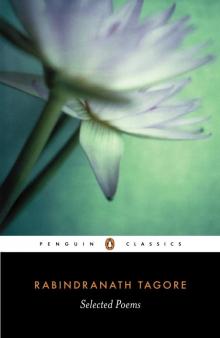 Selected Poems
Selected Poems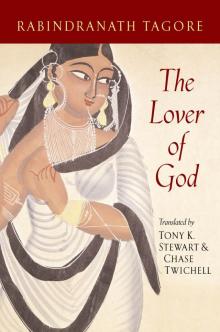 The Lover of God
The Lover of God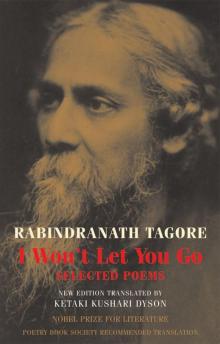 I Won't Let You Go: Selected Poems
I Won't Let You Go: Selected Poems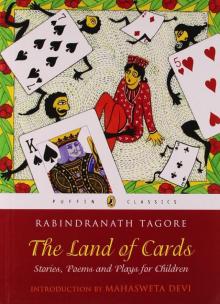 The Land of Cards: Stories, Poems, and Plays for Children
The Land of Cards: Stories, Poems, and Plays for Children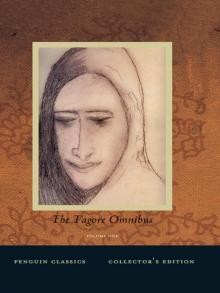 The Tagore Omnibus, Volume One
The Tagore Omnibus, Volume One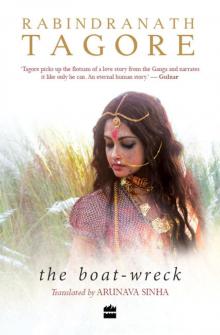 The Boat-wreck
The Boat-wreck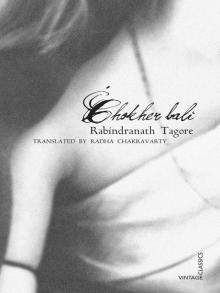 Chokher Bali
Chokher Bali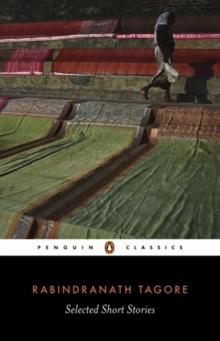 Selected Short Stories
Selected Short Stories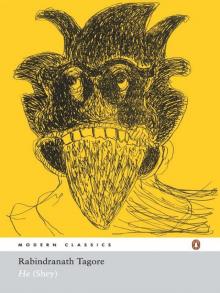 He (Shey)
He (Shey)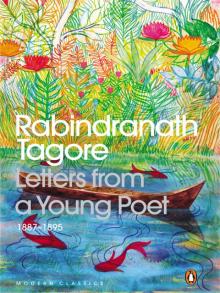 Letters From a Young Poet 1887 1895
Letters From a Young Poet 1887 1895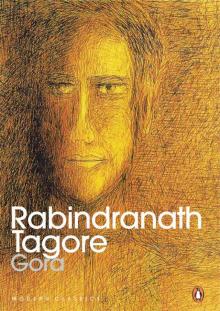 Gora
Gora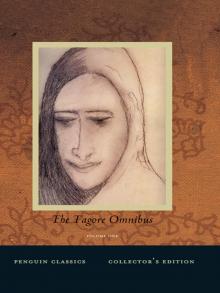 Tagore Omnibus, Volume 1
Tagore Omnibus, Volume 1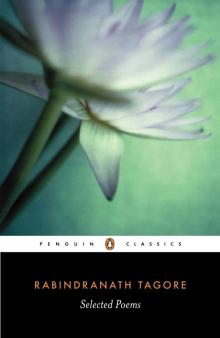 Selected Poems (Tagore, Rabindranath)
Selected Poems (Tagore, Rabindranath)